
Bertrand Arthur William Russell, 3rd Earl Russell, was a British mathematician, logician, philosopher, and public intellectual. He had influence on mathematics, logic, set theory, and various areas of analytic philosophy.

David Ernest McReynolds was an American politician and social activist who was a prominent democratic socialist and pacifist activist. He described himself as "a peace movement bureaucrat" during his 40-year career with the War Resisters League. He was a resident of New York City. McReynolds was twice a candidate for President of the United States, running atop the ticket of the Socialist Party USA in 1980 and 2000. He was the Socialist Party USA's first openly gay presidential candidate. He was also America's first gay presidential candidate if not counting John Hospers - although multiple sources, including the Libertarian Party, have referred to John Hospers, who was in 1972 the first presidential nominee of the newly formed Libertarian Party, as the first openly gay person to run for president of the United States, The Guardian’s obituary stated that his family “strenuously denied” he was gay.
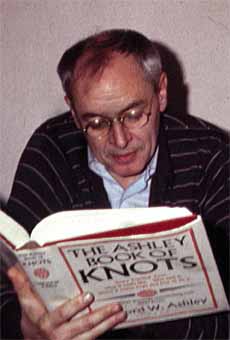
Ronald David Laing, usually cited as R. D. Laing, was a Scottish psychiatrist who wrote extensively on mental illness—in particular, psychosis and schizophrenia. Laing's views on the causes and treatment of psychopathological phenomena were influenced by his study of existential philosophy and ran counter to the chemical and electroshock methods that had become psychiatric orthodoxy. Laing took the expressed feelings of the individual patient or client as valid descriptions of personal experience rather than simply as symptoms of mental illness. Though associated in the public mind with the anti-psychiatry movement, he rejected the label. Laing regarded schizophrenia as the normal psychological adjustment to a dysfunctional social context, although later in life he revised his views.

David Graham Cooper was a South African-born psychiatrist and theorist who was prominent in the anti-psychiatry movement.
Leonard P. Liggio was a classical liberal author, research professor of law at George Mason University and executive vice president of the Atlas Network in Fairfax, Virginia.

The Curtain Theatre was an Elizabethan playhouse located in Hewett Street, Shoreditch, just outside the City of London. It opened in 1577, and continued staging plays until 1624.
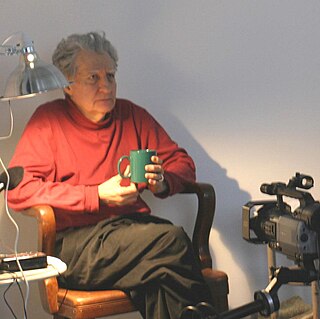
Jackson Mac Low was an American poet, performance artist, composer and playwright, known to most readers of poetry as a practitioner of systematic chance operations and other non-intentional compositional methods in his work, which Mac Low first experienced in the musical work of John Cage, Earle Brown, and Christian Wolff. He was married to the artist Iris Lezak from 1962 to 1978, and to the poet Anne Tardos from 1990 until his death.
Antisexualism is opposition or hostility towards sexual behavior and sexuality.

The Oracle of the City of San Francisco, also known as the San Francisco Oracle, was an underground newspaper published in 12 issues from September 20, 1966, to February 1968 in the Haight-Ashbury neighborhood of that city. Allen Cohen (1940–2004), the editor during the paper's most vibrant period, and Michael Bowen, the art director, were among the founders of the publication. The Oracle was an early member of the Underground Press Syndicate.
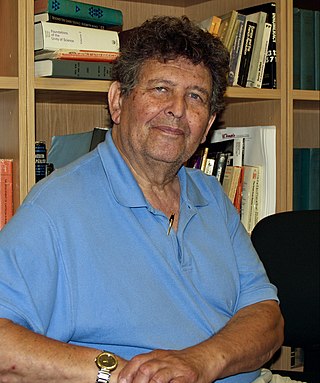
Stanley Aronowitz was an American sociologist, trade union official, and political activist. A professor of sociology, cultural studies, and urban education at the CUNY Graduate Center, his longtime political activism and cultural criticism was influential in the New Left movement of the 1960s, 1970s, and beyond. He was also an advocate for organized labor and a member of the interim consultative committee of the International Organization for a Participatory Society. In 2012, Aronowitz was awarded the Center for Study of Working Class Life's Lifetime Achievement Award at Stony Brook University.

Naphtali "Tuli" Kupferberg was an American counterculture poet, author, singer, cartoonist, publisher, and co-founder of the rock band The Fugs.
Lee Raymond Baxandall was an American writer, translator, editor, and activist. He was first known for his New Left engagement with cultural topics and then as a leader of the naturist movement.
The Midpeninsula Free University (MFU) was one of the largest and most successful of the many free universities that sprang up on and around college campuses in the mid-1960s in the wake of the Free Speech Movement at University of California, Berkeley and the nationwide anti-war Teach-ins which followed. Like other free universities, it featured an open curriculum—anyone who paid the nominal membership fee ($10) could offer a course in anything—marxism, pacifism, candle making, computers, encounter, dance, or literature. Courses were publicized in illustrated catalogs, issued quarterly and widely distributed. It had no campus; classes were taught in homes and storefronts. Its magazine-style illustrated newsletter, The Free You, published articles, features, fiction, poetry, and reviews contributed by both members and nonmembers. The MFU sponsored, Be-Ins, street concerts, a restaurant, a store, and was actively involved in every aspect of the flourishing counterculture on the Midpeninsula, including the anti-war movement at Stanford University.
Calvin Coolidge Hernton was an American sociologist, poet and author, particularly renowned for his 1965 study Sex and Racism in America, which has been described as "a frank look at the role sexual tensions played in the American racial divide, and it helped set the tone for much African-American social criticism over the following decade."
Bradford Lyttle is an American pacifist and peace activist. He was an organizer with the Committee for Non-Violent Action of several major campaigns against militarism, including "Omaha Action", against land-based nuclear missiles (1959) and "Polaris Action" against submarine-based nuclear missiles (1960). Lyttle and several others walked from San Francisco to New York City, and then through parts of Europe to Moscow, Russia, from December 1960 until late 1961. The action was called the San Francisco to Moscow March for Peace. Several participants, including Lyttle, walked the entire distance. He also walked in the Quebec-Washington-Guantanamo Peace Walk (1963).
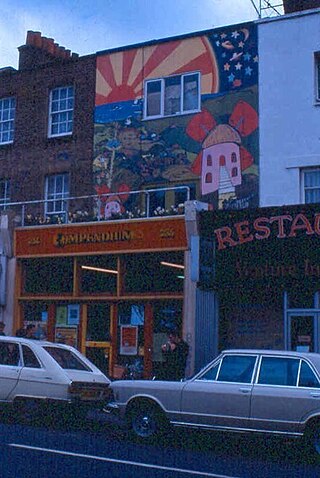
Compendium Books was an independent bookstore in London specialising in experimental literary and theoretical publications, from 1968 until its closure in 2000. The Guardian's John Williams described it as "Britain's pre-eminent radical bookstore. Whether you wanted books on anarchism, drugs, poststructuralism, feminism or Buddhism, Compendium was the place to go."
Obi Benue Egbuna was a Nigerian-born novelist, playwright and political activist known for leading the Universal Coloured People's Association (UCPA) and being a member of the British Black Panther Movement (1968–72) during the years when he lived in England, between 1961 and 1973. Egbuna published several texts on Marxist–Black Power, including Destroy This Temple: The Voice of Black Power in Britain (1971) and The ABC of Black Power Thought (1973).
The congress on the Dialectics of Liberation was an international congress organised in London between 15 and 30 July 1967. It was organised by the American educationalist Joe Berke. The scope of the conference was to "demystify human violence in all its forms, and the social systems from which it emanates, and to explore new forms of action". A short film, Ah, Sunflower, directed by Robert Klinkert and Iain Sinclair, and featuring R. D. Laing, Allen Ginsberg, Stokely Carmichael and others, was filmed around the Dialectics of Liberation conference.
The Free University of New York (FUNY) was an educational social enterprise initiated by Allen Krebs, his wife Sharon Krebs, and James Mellen in July 1965.
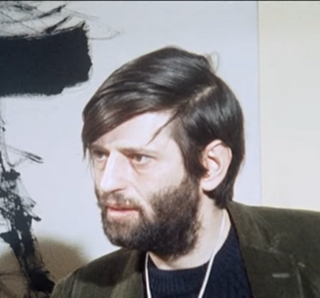
Allen Martin Krebs was an American sociology professor and Marxist educationalist known for co-founding the Free University of New York and the Antiuniversity of London.












